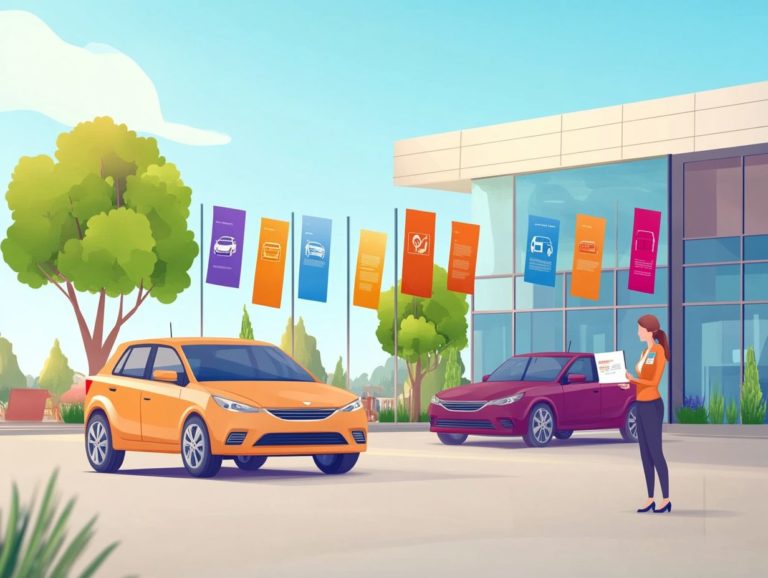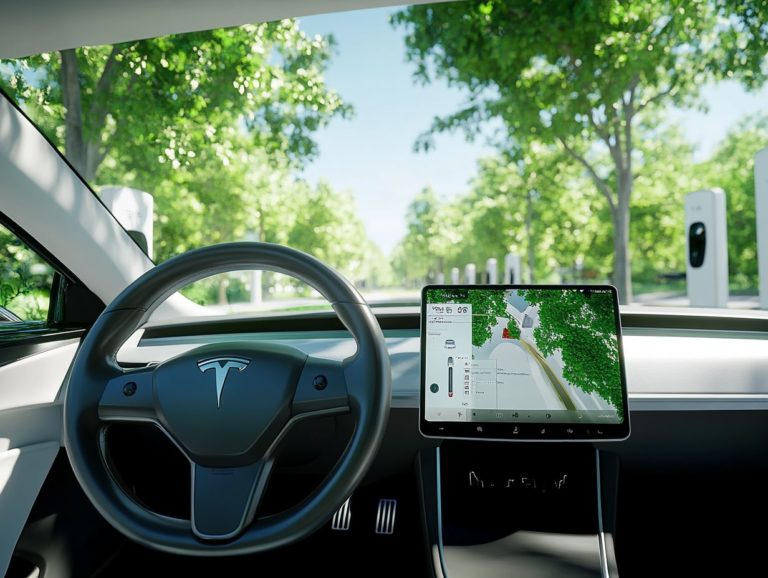5 Steps to Prepare for Buying a New Car
Buying a new car is an exhilarating journey. However, it can also feel a bit daunting with the myriad of options and decisions to navigate.
Whether you re stepping into the world of car ownership for the first time or looking to elevate your current ride, grasping the essential steps can pave the way for your success. This guide will walk you through five crucial steps to prepare for your purchase:
- Determine your budget
- Research different car options
- Evaluate your lifestyle needs
- Take that all-important test drive
- Finalize the deal
You will explore the pros and cons of buying new cars, consider alternative options, and uncover tips for securing the best deal while sidestepping common pitfalls. With the right insights, you’ll be geared up and ready to hit the road in your ideal vehicle.
Contents
- Key Takeaways:
- 1. Determine Your Budget
- 2. Research Different Car Options
- 3. Consider Your Needs and Lifestyle
- 4. Take a Test Drive
- 5. Negotiate and Finalize the Purchase
- Is Buying a New Car the Best Option?
- Frequently Asked Questions
- What are the five steps to prepare for buying a new car?
- How do I determine my budget for buying a new car?
- What should I research and consider when choosing the right car?
- How do I test drive and compare car options?
- How can I negotiate the price and financing for a new car?
- What do I need to do to finalize the purchase of a new car?
Key Takeaways:

- Set a budget and stick to it when buying a new car. Consider all expenses, including insurance and maintenance, to ensure affordability.
- Do thorough research on different car options, considering factors such as fuel efficiency, safety ratings, and resale value.
- Think about your lifestyle and needs when choosing a car, such as space for passengers or cargo, preferred features, and driving habits.
1. Determine Your Budget
Determining your budget is the essential first step in your car-buying journey. This first step connects your finances with your car dreams and aligns with the various costs associated with purchasing a vehicle, such as monthly payments, interest rates, and potential trade-in value. Additionally, understanding 5 things every new car buyer should know can further guide you in making informed decisions.
By crafting a clear personal finance strategy, you ll navigate the often complex world of automotive financing with confidence. This not only keeps you within budget but also allows you to enjoy the advantages of being pre-approved for a loan. Getting pre-approved can significantly enhance your negotiating power at the dealership.
To thoroughly assess your financial situation, it’s essential to look beyond just the monthly car payments. Consider all the costs involved in owning a car, including insurance, maintenance, and fuel expenses.
Understanding how interest rates affect your overall loan payment is vital, as these rates can have a substantial impact on your budget. Additionally, knowing your credit score can be transformative when seeking loan approval; a higher score typically translates to more favorable rates and terms.
Before you visit the dealership, get pre-approved. This gives you a stronger bargaining position and can lead to better deals.
2. Research Different Car Options
Researching different car options is essential when you re in the market for a new vehicle. It gives you the chance to explore both new and used offerings while allowing you to compare prices, features, and reliability across various models and dealerships.
One highly effective strategy is to tap into resources like Kelley Blue Book and Edmunds.com. These platforms provide a treasure trove of information on vehicle values, expert reviews, and consumer feedback, enabling you to make informed decisions that align with your driving needs and budget.
Choosing a used car often leads to significant cost savings, with lower insurance premiums and depreciation rates compared to new models. It’s also crucial to visit reputable dealerships like CarMax and Carvana.com. Here, you can be confident that you re getting quality vehicles backed by thorough inspections and excellent customer service.
3. Consider Your Needs and Lifestyle
When you embark on the journey of car buying, it’s vital to reflect on your needs and lifestyle, as these elements will greatly influence the type of vehicle you select. To assist in this process, consider following a guide on preparing for a used car purchase. This ensures it seamlessly integrates with your daily activities and financial situation.
For example, if you have a large family, spacious SUVs or minivans may take precedence, offering the ample seating and cargo capacity you require.
On the other hand, if you re navigating city life with shorter commutes, you might find that compact cars or hybrids are better suited to your lifestyle, especially if you’re focused on efficiency in both space and fuel consumption.
Your driving habits whether you frequently take long trips or prefer city driving also play a crucial role in determining the ideal fit.
Align your vehicle choice with your budget to enjoy your new car without financial stress! This approach will help you avoid overstretching your budget, allowing you to relish the joy of your new car without the looming worry of financial strain in the future.
4. Take a Test Drive

A test drive is crucial in the car-buying journey. It gives you firsthand experience of the vehicle s performance and comfort.
During this moment, pay close attention to how the car handles. Notice how it responds to your steering and accelerates under different conditions. Comfort matters too; assess the seat support and cabin noise, as these factors can greatly impact your driving experience.
Don t overlook the technology features, such as the infotainment system and safety tech. Evaluating these elements will help you determine how well the vehicle aligns with your preferences. By exploring multiple options during test drives, you can make thorough comparisons.
Finding the right vehicle will not only make your drive enjoyable but also strengthen your position during negotiations, enhancing your chances of securing a better price once you ve narrowed down your choices.
5. Negotiate and Finalize the Purchase
Negotiating and finalizing the purchase of your chosen vehicle requires careful consideration and strategic thinking. It involves discussions about trade-in values, interest rates, and loan terms factors that can affect how much you pay.
To navigate this process effectively, start by researching the market value of similar vehicles and their trade-in rates. This groundwork will give you a solid foundation for negotiation. Additionally, consider 5 ways to save money on your new car purchase while understanding the various financing options available, which can also reveal potential savings, especially when you explore different lenders and scrutinize dealership offers.
Examine extended warranty options closely to ensure they meet your needs and don t come with unnecessary expenses.
Ultimately, aligning your final purchase with your financial goals will foster a sense of security and satisfaction, transforming the dealership experience into a confident investment in your future.
Is Buying a New Car the Best Option?
When considering whether to buy a new car, it s essential to weigh multiple factors, including your financial situation, the benefits of automotive financing, and the overall costs of new car ownership compared to used cars.
Carefully evaluating the pros and cons of each option can significantly impact your final decision.
A new car often entices you with cutting-edge technology, enhanced safety features, and the comfort of a full warranty. However, be aware that new vehicles can depreciate quickly within their first few years, making them a costly investment for long-term value.
On the other hand, choosing a used car can provide a budget-friendly option, typically accompanied by lower insurance costs and slower depreciation.
Both options can be part of a thoughtful car-buying strategy. Understanding how these factors align with your financial goals is vital for achieving long-term stability.
What Are the Benefits of Buying a New Car?
Buying a new car offers remarkable benefits, including full manufacturer warranties, the latest technology features, and the peace of mind that comes with driving a brand-new vehicle.
One standout advantage of warranty coverage is its ability to ease unexpected repair costs, allowing you to budget more effectively without the stress of sudden financial strains.
The comprehensive safety features found in new vehicles, such as advanced braking systems and collision prevention technology, enhance your security on the road and may lead to lower insurance premiums.
Technology innovations like adaptive cruise control and smartphone integration transform driving into a more enjoyable and safer experience, ensuring a smoother, more connected journey.
These factors make investing in a new car appealing for anyone seeking reliability and modern convenience.
What Are the Drawbacks of Buying a New Car?

While the allure of a new car is undeniable, it s important to recognize its drawbacks. You might face significant depreciation, higher insurance costs, and upfront expenses that can strain your finances.
As soon as you drive that new vehicle off the dealership lot, it begins to lose value rapidly often up to 20% in just the first year. This depreciation can greatly affect its resale value later, making it essential to consider potential losses when planning to sell.
Insurance premiums for new cars are usually higher than those for used vehicles, adding another layer to your financial commitments. Maintenance costs can also be higher at first, especially if you choose features that require specialized care.
Given these factors, weigh them against the appeal of a new vehicle to make a wise buying decision.
What Are the Alternatives to Buying a New Car?
Exploring alternatives to buying a new car can unveil options that align with your budget, such as buying a used car, leasing, or considering certified pre-owned vehicles. These choices offer many perks of new cars without the hefty price tag.
Each option has its own advantages and challenges. For example, opting for a pre-owned vehicle can yield significant savings, but it might come with hidden maintenance costs or a shorter lifespan than you’d prefer.
Leasing presents a different allure lower monthly payments and access to the latest technology but it means you won t own the car outright and may face mileage restrictions.
Certified pre-owned vehicles deliver the reassurance of warranties and inspections that ensure reliability while still being more affordable than brand-new models. Ultimately, align these choices with your financial strategy for a well-informed decision.
How Can You Get the Best Deal on a New Car?
Securing the best deal on a new car requires careful research, savvy negotiation, and consideration of financing options. For effective strategies, learn how to prepare for a car negotiation, including working with online lenders to secure favorable loan approval terms.
Start by comparing offers from various dealerships; you might discover significant savings, as prices can vary widely across locations. Gaining insight into market trends enables you to spot overpriced vehicles or capitalize on enticing promotions.
During negotiations, maintain a composed demeanor and be ready to walk away. This can dramatically sway the conversation in your favor, leading to a more advantageous outcome.
Leveraging financing options may help you lock in lower interest rates and accurately assess trade-in values, enabling you to make a compelling offer.
What Are the Common Mistakes to Avoid When Buying a New Car?
When purchasing a new car, steering clear of common mistakes is crucial for ensuring a successful transaction that aligns with your financial situation. For a smoother experience, consider these 5 tips for a stress-free new car purchase.
Overlooking the total cost of ownership, ignoring loan terms, and neglecting to negotiate can lead to unnecessary complications. Many buyers are captivated by shiny exteriors and impressive features but forget to conduct thorough research on vehicle prices. Don t let this oversight cost you more than it should!
Make sure you shop around to find the best prices at different dealerships. Failing to grasp financing nuances can leave you trapped in unfavorable loan agreements. Familiarize yourself with key financing concepts, such as interest rates, loan duration, and down payments, to make well-informed decisions.
Navigating these complexities enhances your car-buying experience and protects you from future financial pitfalls.
Frequently Asked Questions

What are the five steps to prepare for buying a new car?
The five steps to prepare for buying a new car are: determining your budget, researching and choosing the right car, test driving and comparing options, negotiating the price and financing, and finalizing the purchase and paperwork.
How do I determine my budget for buying a new car?
Start by calculating your monthly income and expenses. Subtract your expenses from your income to see how much you can spend on a car payment.
Include other costs like insurance, maintenance, and fuel in your budget planning.
What should I research and consider when choosing the right car?
Consider your needs, lifestyle, and the type of vehicle you want, like a sedan or SUV. Look at fuel efficiency, safety ratings, and available features.
Don t miss out on great deals! Dive into reviews and compare prices to secure the best value.
How do I test drive and compare car options?
Create a list of your top choices and visit dealerships for test drives. To ensure you get the best offers, consider following 5 tips for finding the best new car deals. Pay attention to features, performance, and your overall feel for the car.
After test driving, weigh the pros and cons of each car to find the best fit for your needs and budget.
How can I negotiate the price and financing for a new car?
Research the average price for the make and model you want. Use this information as your starting point during negotiations.
Consider various ways to pay from different lenders, and be ready to walk away if the terms don t meet your expectations.
What do I need to do to finalize the purchase of a new car?
Understand all terms and conditions of the sale, including warranties or additional fees. Review and sign all necessary paperwork like the sales contract and financing agreement.
Lastly, ensure you have insurance coverage before driving off with your new car.






